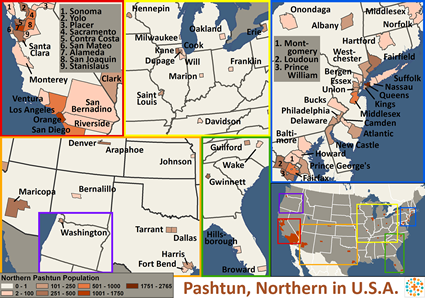The Pashtun have been called the largest Muslim tribal society in the world. There are at least 30 major tribes, and countless sub-tribes and clans. Spread over a vast geographical area and driven by socio-economic, political, tribal and linguistic (dialectical) differences, Pashtuns nevertheless share a unique sense of common identity. Pashtun identity is based on four elements: Heritage (descent from a common ancestor); Islam (99.9% Muslim); the Pashtunwali Code of Honor ("The Way of the Pashtun"); and to some extent, Language (Pakhtu or Pashto). They live primarily in Afghanistan and Pakistan, though there is a significant Pashtun diaspora in the Arab Gulf, especially the UAE, and many Western countries such as the United States.
There have been efforts to reach the Pashtun since 1818, when William Carey translated parts of the Old Testament into Pakhto, based on interaction with Pashtun traders who caravanned (and settled) across north India and beyond. (In South Asia, the name "Pashtun/Pakhtun" was anglicized to "Pathan"—a name immortalized in Rudyard Kipling's novels and British colonial history; today, the Pashtun in India, Bangladesh, and throughout South Asia are known as "Pathan".) The first intentional mission to the Pashtun was launched by the Church Missionary Society in Peshawar, Pakistan in 1853. This was followed by over 150 years of faithful witness, through mission hospitals, schools, colleges, literature, friendship evangelism, and other forms of witness by national Pakistani (Punjabi) Christians and expatriate missionaries. Despite this record and the slow but growing number of scattered Pashtun believers, a vibrant, indigenous, Disciple Making Movement has yet to take root and spread.
More significant than dialectical differences, a Pashtun's primary loyalty is to his particular social group (tribe or sub-tribe). The Pashtun were the traditional rulers of Afghanistan for over 250 years. Since the overthrow of the Afghan king, communist coup and Soviet invasion in the 1970s, Afghanistan has been in a state of constant conflict. In the 1970's and 1980 's, the Pakistan-Afghanistan borderlands were the launchpad for mujahideen ("freedom fighters") who, with Western, Saudi, and global support, resisted and overthrew the communist regime. The cost was high; over 3.5 million refugees settled into hundreds of refugee camps in border provinces of Iran and Pakistan and one-third of the Pashtun population was displaced.
During the 1990s, Pashtun tribal areas and thousands of Arab-funded madrassas (religious schools) throughout Pakistan, became the seedbed for the rise of the Taliban movement. Driven by a combination of religious zeal and Pashtun nationalism, and fueled by Arab money, the "Taliban" (a term for "religious students") imposed a harsh, hyper-conservative (Wahabi) version of Islam on the country. Unfortunately, attempts toward a peace accord and durable central government have, to date, been unsuccessful. Armed opposition continues. As a result, there is a steady stream of Pashtuns leaving their homeland for safer places.
Where Are they Located?
The majority of Pashtun live in Pakistan, but there are Pashtuns in many other countries as well. You can find them in other Central Asian countries like Iran, Kyrgyzstan, and Tajikistan. They live in many industrialized nations such as the US. In the US there is a large Afghan Diaspora in Fremont, CA where they are famous for their restaurants and exotic markets. Afghans are also very numerous in northern Virginia, New York, and the northeastern states.
Instability, endemic corruption, and on-going violence led to widespread migration of tens of thousands of Afghans (mainly young men) seeking jobs and opportunity in Russia, Europe, and the West.
Since the late 1970s, Pashtuns have been starting anew in various countries. Typically, these Western countries are more likely to allow Pashtuns to arrive who have money and/or skills in business, education, medicine, etc. By this time there are Pashtuns who are very acculturated to their new countries, and they are very different than their elders who arrived in previous decades. At the same time, other, unacculturated Pashtuns are still arriving, adding to the complexities of the Pashtun Diaspora.
Most Afghans in the US are not Pashtun, however. Many of them were allowed to enter the US since they were translators, etc. during the Afghan War, and it would not be safe for them to remain in their old country.
Whether they are new in Western countries or they have never been to the original Pashtun homeland, Pashtuns almost always identify themselves as Muslims. They will be married in a mosque, and to be associated with another religious system would be unacceptable in their community. Those who want to take Christ to the Pashtuns will need to do just that; take Christ to them, not a religious system.
The Pashtunwali Code of Honor erodes among Pashtuns who live in urban settings in the West. Some of them have only a weak identity as Muslims or as Pashtuns. They need to find their identity in the Savior who loves them and wants them to be transformed into His likeness.
No one knows how many Pashtuns are following Jesus. Seeds of the Gospel have been sown widely. The greatest barriers to faith are social and cultural, leaving us with the challenge of allowing Pashtuns to embrace Christ while keeping their culture and traditions. Those who are in Western nations have a tremendous opportunity to embrace the Savior, but, like other immigrants, they are most open only soon after they arrive. If the job is postponed for more than a year or two, the opportunity is lost. Unfortunately, churches in the West would much rather go to a far-off place and work with other Christians than reach unreached Muslims in their midst, so most mission fields remain unmanned. Only 1/31 of our missionaries go to the unreached people groups (ethne) described in the Great Commission.
Pray for the Church in America to strengthen their efforts to reach unreached peoples in their midst.
Pray for a movement to Christ among the Pashtuns Diaspora that will spread far and wide.
Pray for the production and distribution of all forms of media in the Pashto language for the Pashtun Diaspora.
Pray for more workers to live among the Pashtuns and work beside them, giving them the opportunity to tell them about Jesus Christ, the Savior of all nations.
Pray for God's Spirit to strengthen and protect new believers and to empower them to take Christ to other Pashtun communities.
Scripture Prayers for the Pashtun, Northern in United States.
https://en.wikipedia.org/wiki/Afghan_Americans
https://www.youtube.com/watch?v=_KdiE2WtWAA
http://www.allied-media.com/Afghan_American/index.html
| Profile Source: Joshua Project |
| Other PDF Profile |

























